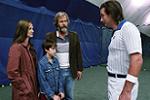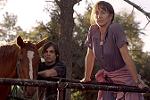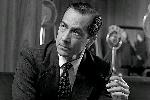
In less than 12 hours, the 2005 Oscar nominations will be announced. This much is certain.
Nearly as certain is that I will be nonplussed by the roster.
No films I truly love are likely to reap very much
attention from the Academy, which is why I get to spend one night pretending that all of my personal pets
are everyone else's,
too. So here's the scene: me, in Balenciaga (or Vosovic!), envelopes in my hand, my creative idols all in attendance, everyone a winner.
(Click on the links to my favorites from 1999, 2000, 2001,
2002, 2003, and 2004 to indulge more of my solipsistic fantasies.)
· General · Directing · Acting · Writing · Visuals & Editing · Sound & Music · Effects · Stats & Extras ·
General Categories
|
Best Picture
|





|
The Beat That My Heart Skipped
|
That baroque, elusive title is one of the movie's most entrancing challenges. In many ways, Beat exhibits almost
total arrhythmia, dropping characters and adding others when we don't expect, skirting ahead here and stopping there for a
pause, careening to a climactic halt, followed by an especially tricky and soul-sickening end. And yet you do feel something
like a meter in all of this, guiding the New Wave edits and diverse soundscapes through this innately modern world.
|
Grizzly Man
|
Bear with me (I couldn't help it), but Grizzly Man monumentally exceeds mere curiosity value because of how thoroughly
it engages with a problem that has flummoxed so many documentaries with more obviously political aims. In contrast to
Treadwell's rampant idealism and Herzog's Hobbesian eye, I experience Treadwell's story as a stunning parable of fundamentalism:
how an addiction to a virtually arbitrary object (an animal, a nation, a scripture, an ideology) can evolve into something
like a death drive.
|
Junebug
|
Part of the reason Junebug so famously exceeds the dimensions of what looks like a culture-clash comedy is that neither
of the "cultures" are all that coherent in themselves. The marriage of George and Madeleine stands
on a thin pedestal of partial acquaintance and selective communication, and the North Carolina household where almost everything
happens is simultaneously a place where almost nothing happens. But none of this flatters our presumed grasp of social
relations, urging us instead to perceive new kinds of bonds.
|
The New World
|
The New World doesn't spark my curiosity about John Smith or Pocahontas, or even about the American colonists or the
Powhatan people, so much as it sends me sailing out of the theater with questions about Malick. Who raised him, and when, and
how, so that he never felt invested in parsing "reality" from reverie, so that he felt so powerfully inclined to listen to
every eccentric voice, even the ones that never existed until he scripted them? [Note to readers: please don't answer these
questions. The magic is in the wondering.]
|
Palindromes
|
I can't claim to know why Palindromes is called Palindromes. I don't see that the casting of multiple actors
in one role suggests anything new or interesting about the foundations of personality. A lot of the movie's most conspicuous
identifying marks are less intriguing to me than what lies underneath the whole project, the million ways in which American
culture obsesses itself with innocent infants and pathologized adults, so that the riven, confused, inchoate years of childhood
and adolescence as they are actually lived are almost invisible to popular regard, and ripe for the kinds of surreal figures
and the skewed but revealing exaggerations that Solondz offers here.
|
|
Best Non-English Language Film
|





|
The Beat That My Heart Skipped
France
|
The French New Wave has never fully ebbed, but not everyone knows how to marshal its techniques into something that feels
both historied and contemporary. The characters that fill Audiard's movie would likely have fascinated Godard in the Breathless
years, but the energies and tensions driving the movie feel even more up-to-the-minute than those in Caché.
|
The Holy Girl
Argentina
|
The Holy Girl is adventurous, frisky, and innovative in the way that Jane Campion was in the era of Sweetie,
but with a deeper absorption of how Buñuelian surrealism can attach itself to a meaningful narrative and of how sound,
image, and structure can give forth their own mercurial insights. Martel's next movie could easily be a masterpiece.
|
Kings and Queen
France
|
Kings and Queen wasn't at all the movie I expected it to be; surely it is impossible to feel otherwise. My favorite
shot is when Emmanuelle Devos debarks the train on the way to visit her father, and while a goldenrod light dapples the quay,
a sharp symphonic string melody subtly agitates the symmetrical image. The film is full of such passing impressions, adding
up to an oddly satisfying whole even as they perpetually imply hundreds of different, parallel versions of what might have
been.
|
Trilogy: The Weeping Meadow
Greece
|
Enjoying Angelopoulos feels like an even more contrarian gesture than admiring him. So poker-faced are his movies, so
monumentalist in conception and execution, that one expects them to feel remote and glassed-off, like museum exhibits. But
The Weeping Meadow is full of plaintive images and narrative brush-strokes, and this director's inimitable way of
evoking history's vastness is a pleasure that doesn't dissipate.
|
Tropical Malady
Thailand |
I saw all three of Apichatpong's features in the last 12 months, and I assent to every article, blog entry, and board-posting
I have read that heralds him as the international filmmaker to watch. His films have a loosey-goosey construction that
pervades the comic scenes as much as the sexual and allegorical ones, and yet his trademark POV shots through the windshields
of moving cars are somehow just as winning. No movie in 2005 (or 2004) was so utterly its own as this one.
|
|
Best Documentary Feature
|





|
Darwin's Nightmare
Hubert Sauper, dir.
|
Sauper can hardly be accused of editing his movie with perfect coherence, but images of tiled factory walls, rotting fish,
wrecked airplanes, and an air-traffic controller undone by a fly tell their own story.
|
Grizzly Man
Werner Herzog, dir.
|
An artist intervenes where the tabloid industry might so easily have pre-empted him, and from an account of a horrible death
he finds the possibility of an oddly perfect one, shadowed by a pointless second death and a host of complicated questions.
|
Murderball
Henry Alex Rubin &
Dana Adam Shapiro, dirs.
|
Murderball is a thrilling sports movie where one might have expected some moist advocacy for athletes who don't want it.
The action footage excites, but the fully rounded portraits of the players and coaches is the linchpin of the film. The
ending is one of the year's best, all the more so for being such a surprise.
|
Rize
David LaChappelle, dir.
|
Least convincing in its pretense toward world-historical resonance (which is thankfully exhausted in the earliest scenes),
Rize is as vital and muscular as Murderball, inflated by a perfect soundtrack into a nerve-crackling event.
|
Winter Soldier
Winterfilm Collective, dirs. |
More a document than a documentary, Winter Soldier relays the agonized testimonies of Vietnam War veterans with impressive
sobriety, connecting most viscerally when its grasp of war intersects with other planes of American politics.
|
Directing
|
Best Director
|





|
Jacques Audiard
The Beat That My Heart Skipped
|
Basing my impressions only on Read My Lips and The Beat That My Heart Skipped, I'm prepared to believe that
Audiard's view of the modern city and of bristly inner life could accommodate almost any story, even these unexpected thriller-dramas
about frazzled office workers flirting with crime and a frazzled criminal flirting with refinement. On paper, that doesn't
sound like much range, but his way of depicting these often caricatured lifeworlds is, these days, almost unmatched.
|
Arnaud Desplechin
Kings and Queen
|
By contrast to Audiard's impressively steady hand, even when he's doling out jump cuts and whipping pans and other manic
devices, Arnaud Desplechin hovers at the edge of folly even when he holds a shot, even when he follows an extended monologue.
Kings and Queen never passes an insurance juncture where the film is guaranteed to work. Its blend of the frenetic,
the loopy, and the plaintive is always a high-wire act, and though it isn't always steady, it is often sublime.
|
Werner Herzog
Grizzly Man
|
Herzog's direction of Grizzly Man might seem like small beans to a viewer who holds it against him that he didn't
actually shoot more than half of the footage in the movie, or who feel that yet another story of another deluded Icarus cannot
possibly pose any challenge at this point in his career. But how many directors could coax any larger message out of Treadwell's
Alaskan folly? How many would also pay such fair testament to why Treadwell chased this destiny, and who would look into these
comical fragments, these florid soliloquies, and see to the bottom of what's going on in them?
|
Terrence Malick
The New World
|
In the coming years, academics and disciples will insist that the multiple versions and bungled release of The New World
is a perfect metaphor for Malick's aesthetic, where parallel realities bleed outward from scenarios that should seem so simple—a
killing and robbing spree, a WWII battle, a legend that every American child knows by heart. This will be a happy
development for a lot of embarrassed advertisers and egg-faced studio executives who rushed the movie and hastened to tip what
they clearly felt was a shaky hand. But the movie calls the bluff of all of this: apart from the PR rhetoric and the last-minute
nip/tucks, The New World continues Malick's distinctive line of kaleidoscopic visions and tantric meditations.
|
Phil Morrison
Junebug
|
Movies about the American South, not counting the parodies. Family dramedies, not counting the sitcoms and the sopping-wet
valentines. Scenes from a marriage, not counting Bergman's. These genres are hardly over-stuffed with triumphs, and yet
Morrison directs with almost unflappable confidence, lingering on spaces that interest us because they interest him so
unexpectedly, devoting his camera to simple gestures—the packing of dishes, the tossing of a`book, the waving-dry of
fingernails—that often illuminate multiple characters and themes at once.
|
Acting Categories
|
Best Actress
|





|
Joan Allen
The Upside of Anger
|
When Joan Allen first sat down to a sozzled meal with her daughters in The Upside of Anger, I fretted: the movie's all
wrong, the drunkenness over-played, the prospects dim. Where's my trust? True, the actors playing her children seem all but
paralyzed by the genius in their midst, but well they might be: Allen keeps doling out character details, exasperated jokes,
off-putting tics, and flashes of empathetic lucidity.
|
Sasha Andres
She's One of Us
|
Siegrid Alnoy's She's One of Us is one of those visually deterministic, idea-driven movies that you immmediately race
to pair analogically with others—many others. But Sasha Andres, an ample reason to keep watching in the early scenes,
graduates to such a range of neurotic and sociopathic behaviors that she finally raises the movie along with her, playing
against the grain of her scenes as often as not and, I think, eclipsing Christian Bale's Patrick Bateman as a paragon of
corporate Guignol.
|
Jennifer Connelly
Dark Water
|
Quentin Crisp, repeating an old witticism in The Celluloid Closet: "I don't like peas, and I'm glad I don't like them,
because if I liked them, I would eat them, and I hate them." This comment is a reasonable Rosetta Stone for my feelings in
recent years about J.Con, an actress I not only disliked but wanted to dislike, because the reasons to like her—her beauty,
her penchant for restive dewiness—seemed so easy. But in Dark Water, she established her abilities and her disciplined
good sense, bravely fraying our confidence in the character throughout, steering clear
of a Jodie Foster-ish urge to validate her by the end.
|
Embeth Davidtz
Junebug
|
The first thing that fascinates in Junebug is the way Embeth Davidtz looks across a crowded room at Alessandro Nivola
as he contemplates a painting. Palpably aroused by this high-buzz environment, but also by this remote figure, Davidtz establishes
a kind of omnivorous excitability that will mark her character throughout, sometimes making her a shrewd reader and at other
times a poor judge, sometimes inviting kindness and beautifully reciprocating it, and sometimes getting her in trouble. It's
the film's best performance, and that's saying something.
|
Nathalie Press
My Summer of Love
|
Nathalie Press has three main challenges in My Summer of Love: she has to animate the character of 1) an almost elfin misfit
and 2) voracious free-spirit who 3) exhibits a cryptic and watchful sensuousness. And actually she has six main challenges,
because she has to do all this without just xeroxing earlier performances by 4) Sissy Spacek, 5) Kate Winslet, or 6) Samantha
Morton, no matter how much her director, cinematographer, and rapt audience might wish her to. Bully for Press, then, that
she fashions this naughty sprite in a way that feels freshly her own.
|
|
Best Actor
|





|
Jeff Daniels
The Squid and the Whale
|
Some people consider this a supporting performance, but even beyond his hefty amount of screen time, Daniels places himself
at the epicenter of the movie by playing his character as the Patient Zero in his family's pandemic contagion of narcissism
and myopia. He knows that not all self-involvements are equivalent, and he sculpts exactly the kind that would inspire a
son while alienating a wife—not to mention the kind that hugely entertains the same audience he so thoroughly repels.
|
Daniel Day-Lewis
The Ballad of Jack and Rose
|
Given Jack and Rose's early release date and minuscule scale, it was all but a foregone conclusion that
Day-Lewis' performance would go unrecognized by year-end groups. Still, I hope that people beyond his most devoted fans
will save the movie from total obscurity. With fewer surface affectations than he tends to employ, Day-Lewis worms right into
the heart of another father who is doing his damnedest to ruin his child, though he of course imagines he is saving her. He
convincingly makes Jack a giant in his own mind and a gaunt shade on screen, placing the character's truth somewhere in the middle.
|
Romain Duris
The Beat That My Heart Skipped
|
Duris' part, much like its cross-cultural equivalent in Hustle & Flow, is a thin conceit until he
steps into its shoes, and I mean that quite literally: it's Duris' physical syntax, scurrying like a sewer rat, clenched
with almost arthritic panic and self-censure, that most credibly personifies Audiard's script and style, giving value and clarity
to the high-dramatic denouement.
|
Bruno Ganz
Downfall
|
Bruno Ganz is hardly a slip of a thing, and yet his Hitler feels several heads shorter than everyone else in the same movie,
reaching up to clap the shoulders of his doomed accomplices, his tantrums more like the low-lying burst of a landmine than
the anger of a human being. Whether his own blend of stylized gesture and psychological realism set the tone for Downfall's
general embrace of that register or whether he tailored his approach to Hirschbiegel's vision, the fit is eerily perfect.
|
Terrence Howard
Hustle & Flow
|
In the picture above, Terrence Howard's golden-grey eyes almost cross in fascination with that lava lamp: the sort of detail
in an image that can feel like a key to an entire character. Howard doesn't play the music scenes as DJay's redemption so
much as an extension of his problem, his tendency to be narrowly and almost violently focused on the things he thinks he loves,
all but guaranteeing that they won't survive any better than he does. Hip-hop provides a new link in the chain around his heart
and his moral intelligence.
|
Best Supporting Actress
|





|
Amy Adams
Junebug
|
My first trip through Amy Adams' performance in Junebug was a luscious immersion in her sweet incandescence: she
maintains Ashley's wide-eyed amazement and garrulous warmth with the stamina of a high-diver or figure skater,
the kind of athlete who makes grace and simplicity seem almost effortless. On a second visit, I better appreciated the subtle detailing of her
performance—planting the seeds of Ashley's pre-natal anxiety and sexual loneliness, well outside the scenes where these
traits are most obvious. A happy face with hidden layers, without a trace of stock-character typing.
|
Maria Bello
A History of Violence
|
The women in Cronenberg movies are often the terrified but fascinated onlookers by the side of mutating or collapsing
men, but as in the best cases, Maria Bello contributes something much more than an audience surrogate or a haunted wife-mother.
Not just her playful bedroom exuberance but her spry, confident stride, her forceful but unintimidating parenting, her reading
of the line "Tell me the truth" as though, for the first time in her marriage, she might not get it—all of these qualities
make Edie Stall an intriguing character study, and a potent force in the film.
|
Maggie Gyllenhaal
Happy Endings
|
From the first time we spot her lounging in the audience of a bar-band, Maggie Gyllenhaal's Jules makes Happy Endings
into a slightly different movie than it has been up to that point. Don Roos is a terrific but schematic screenwriter, and he needs
actors like Gyllenhaal who supply their characters with even more humor, mystique, sexiness, and veiled villainy than he supplies
them. Of course, the structuring of the film's end proves that Roos knows how special this character and this actress are.
Maggie sings a long, ironic, possibly imaginary goodbye, but she's had us since hello.
|
Debra Monk
Palindromes
|
Tony winner Debra Monk is one of those theater actresses like Celia Weston, Lois Smith, and Jayne Atkinson who
always raise the pedigree of their films, even though we rarely meet their characters in more than small
doses. Palindromes gives her a plum opportunity to humanize the movie just when it could most teeter into easy condemnation,
and though she accepts the challenge of Solondz's cancerous humor—listen how she whimpers, "She didn't even have any legs!"—she
also stands by her character, delves into her, and helps us to see what the movie is most deeply about.
|
Rachel Weisz
The Constant Gardener
|
The Constant Gardener ran neck and neck with Good Night, and Good Luck. as the 2005 film most slavishly in
service of a one-stop political agenda, and though the casts and aesthetics of both films are pleasing, they have a hell of
a time complicating the surrounding agenda, much less breaking free of it. But Weisz does just this, effectively playing the truth-speaking
martyr as a relentless self-dramatizer. You can see from her performance, more than from the script, why a multinational corporation
might want to kill her, but you also get drawn to her spark, her ire.
|
Best Supporting Actor
|





|
Clifton Collins, Jr.
Capote
|
Capote is, at last, so preoccupied with the spiraling journey of its protagonist's soul that Perry Smith, the convict
who places his life story in Truman Capote's hands, could easily be left a riddle, a foil, or an antagonist. And indeed, Perry
is all these things, but because Collins captures both the spiritual fright in Perry's eyes and his burning anger at this final
flick-off from a world he keeps trying, disastrously, to connect to, Perry achieves his own crucial life force in this drama
about death. |
Hippolyte Girardot
Kings and Queen
|
Kings and Queen is so stuffed with tones and
influences, genres and characters, cameos and moods, that a long time passes before a guess is even possible as to the film's
overall import. I would argue that Desplechin has rescued the farce as a 21st-century form, and it's Girardot's oxygenating, literally hysterical scenes as Ismaël's drug-addled lawyer that
help us not just to see what the film is doing but to enjoy the journey.
|
Jesse L. Martin
Rent
|
Even though I didn't agree with them, I can understand why Rent's detractors think
that the show's thematic oppositions are crude and naïve, that its songs are klutzily sequenced (and sometimes just klutzy),
and that it really requires a live cast and a theatrical audience for the material to play to its strengths. A major
obstacle to all of these protests is Martin, whose singing emanates such profound feeling, who wears his character so comfortably
on his shoulders, and who taps so poignantly into the experience of a lover's grief that Rent feels immediate, healthy,
and not a day past its prime.
|
Mickey Rourke
Sin City
|
Sin City's fluorescent black & white aesthetic is seductive from the outset, but as the
joy as well as the novelty in its art direction begins to dissipate, you realize what a powerful role Rourke played in keeping
the game alive as long as it lasted. That hard-bitten narration, the startling gestures and movements, the uncanny discovery
and communication of a character beneath all that fussy makeup and post-production is the only real miracle in the film. |
Jim True-Frost
Off the Map
|
Jim True-Frost's assignment in Off the Map seems impossible, adrift somewhere between
the vague and the clichéd. His character, an IRS inspector, has to show up at a reclusive Southwestern family's cabin,
survive a sudden and mysterious illness, awaken to the subtle and unique vibrations of their world and lifestyle, and commit
himself even more fully to that world—forever after—than they have. Thankfully, this perpetually underrated actor,
so perfect in tiny roles in The Hudsucker Proxy and Affliction, gets another chance to show us how much he can
do with what seems like nothing to work from. |
Writing Categories
Best Original Screenplay
Michael Rohatyn & Ira Sachs
Forty Shades of Blue
Lucrecia Martel
The Holy Girl
Angus MacLachlan
Junebug
Todd Solondz
Palindromes
Noah Baumbach
The Squid and the Whale
|
 Well beyond having been written directly for the screen, what these five screenplays all have in common is their knack for
both revealing and concealing layer after layer in their characters, confounding our presumptuous belief that we have seen
some of these stories before, or that we can quickly decipher the tone or intended "message" of the filmmaker. These five
laboratories in constantly revised expectations, in excavating surprise and dimension from overfamiliar contexts, they again
explode that tired adage that cinema can't access the "inner life" of its characters
the way that written literature can. Just watch The Holy Girl and luxuriate in all the conflicts of meaning, misperception,
intention, revulsion, and curiosity that motivate the lead character's decision to pursue the man who has coarsely
and anonymously objectified her. Some of the most fascinating dimensions of this character's motivation—as far as we can
glean it, since The Holy Girl's translucency is more exciting than simple transparency would be—make themselves felt
when she isn't even on-screen. Martel knows how to build oblique suggestions, communal elements, and unspoken internal debates
into her screenplays—a set of talents she shares with Ira Sachs, who, like Martel, puts his own movie in the best possible
light through careful and detailed direction, but who still deserves credit for having started from such a freshly imagined
scenario.
Well beyond having been written directly for the screen, what these five screenplays all have in common is their knack for
both revealing and concealing layer after layer in their characters, confounding our presumptuous belief that we have seen
some of these stories before, or that we can quickly decipher the tone or intended "message" of the filmmaker. These five
laboratories in constantly revised expectations, in excavating surprise and dimension from overfamiliar contexts, they again
explode that tired adage that cinema can't access the "inner life" of its characters
the way that written literature can. Just watch The Holy Girl and luxuriate in all the conflicts of meaning, misperception,
intention, revulsion, and curiosity that motivate the lead character's decision to pursue the man who has coarsely
and anonymously objectified her. Some of the most fascinating dimensions of this character's motivation—as far as we can
glean it, since The Holy Girl's translucency is more exciting than simple transparency would be—make themselves felt
when she isn't even on-screen. Martel knows how to build oblique suggestions, communal elements, and unspoken internal debates
into her screenplays—a set of talents she shares with Ira Sachs, who, like Martel, puts his own movie in the best possible
light through careful and detailed direction, but who still deserves credit for having started from such a freshly imagined
scenario.
Junebug, Palindromes, and The Squid and the Whale hone in on the fascinating but often redundant issues
of culture clash, social and religious hypocrisies, and the dynamics of a splintering family, and while each film has a healthy-sized
funnybone, they also know their characters and their own stakes with a thoroughness that exceeds any punchline. Junebug
retains a wisdom that seemed to evaporate everywhere else in the culture in 2005: the elementary idea that few people, if any,
are reducible to a stereotype or an ideology, and that people's complexity is both more illuminating and more wounding than
any one-dimensional conception of them could be. The Squid and the Whale serves up the kinds of situations, characters,
and dialogues that beg the audience to judge the characters, but the source of just what is wrong with this family is richer
and more interesting than any one character's betrayal or limitation. It's an expertly wrought tale, as Junebug is,
of what people do and don't see when they look at each other, of what they're prepared to take on faith, and of what it feels like
to want to laugh and cry at the day-to-day episodes of your own life. Of all of these pictures, Palindromes might set
itself the most difficult task. Solondz doesn't "hate everyone," at least not in this movie, and I don't think he's after
easy targets like religious fundamentalists or pedophiles or deluded suburbans. I think he's curious about why American society
so sacralizes the figure of the child, born or otherwise. His conclusions, if he has any, are no more foregone than his targets,
which makes the picture especially rewarding to visit more than once.
|
Best Adapted Screenplay
Jacques Audiard &
Tonino Benacquista
The Beat That My Heart Skipped
Dan Futterman
Capote
Tony Kushner & Eric Roth
Munich
Joan Ackermann
Off the Map
Deborah Moggach
Pride & Prejudice
|
 The Beat That My Heart Skipped is a story about an avowed criminal who vainly reaches
out his hand toward the one thing that might sublimate his sorry life. Munich is a story about a humble and happy
citizen who reaches out his hand toward the one calling that is almost guaranteed to erode and worry his life. Much
of the strength in both films lies in the way they amass climaxes of action, Socratic debates, anxious and wordless meditations,
narrative detours and cul-de-sacs, righteous vengeance, guilty secrets, collective bonhomie, disturbing sexuality, and points
of no return into erratic, kinetic narratives that flirt with the edge of chaos but finally prove to be solid, even inspired
structures for highlighting the root themes of the films. Sometimes both films feel like they're better at framing tense or
insightful sequences than at rounding out the edges and building the ligaments of a sustained film, but this shortcoming comes
more and more to feel like a closet strength. The Beat That My Heart Skipped is a story about an avowed criminal who vainly reaches
out his hand toward the one thing that might sublimate his sorry life. Munich is a story about a humble and happy
citizen who reaches out his hand toward the one calling that is almost guaranteed to erode and worry his life. Much
of the strength in both films lies in the way they amass climaxes of action, Socratic debates, anxious and wordless meditations,
narrative detours and cul-de-sacs, righteous vengeance, guilty secrets, collective bonhomie, disturbing sexuality, and points
of no return into erratic, kinetic narratives that flirt with the edge of chaos but finally prove to be solid, even inspired
structures for highlighting the root themes of the films. Sometimes both films feel like they're better at framing tense or
insightful sequences than at rounding out the edges and building the ligaments of a sustained film, but this shortcoming comes
more and more to feel like a closet strength.
On the other end of the adaptation spectrum (not that there is one, but bear with me), Joan Ackermann's adaptation of her own
play Off the Map and Dan Futterman's streamlined consolidation of a biography called Capote are smooth, quiet
pieces that only gradually tip their hands is to what is subliminally going on inside the heads of their characters. In Map,
it's a series of tranquil spiritual epiphanies, but minus all the customary gauze and improbable monologues; in Capote, it's a
corker of a Faustian bargain, which reaches its apex of glory and achievement just as a fathomless killer, scooped and scraped
by a famous writer for all the juicy meat of his story, climbs the gallows to his death. The deliberate and sometimes languid
delivery of information—narrative, psychological, contextual—is key to both films and represents a major vote of audience
confidence from these superb screenwriters. Finally, Deborah Moggach (and her helper behind the curtain, Emma Thompson)
may well be guilty of simplifying and exaggerating some of Jane Austen's conceptions, but their
departures are all in the interest of breathing new, infectious life into a story that retains most of its essential features
and, even better, feels possessed of the same contagious energy and empathy that glow from its pages.
|
Visuals & Editing
|
Best Cinematography
|

|
Stéphane Fontaine
The Beat That My Heart Skipped |
Expertly in line with the film's main character, the camera burrows, quakes, and clenches but remains understated. Smart close-ups
and color choices, and brilliant manipulation of focus. |
Felix Monti
The Holy Girl |
The film amply affords its sparseness of dialogue because the images are so voluble, claustrophobic but teasingly sexy, amping some colors but
suppressing others. |
Emmanuel Lubezki
The New World |
In case you're feeling like an established wunderkind in need of new challenges, try shooting an epic movie with a constantly
moving camera using only available light. And make it sing. |
Andreas Sinanos
Trilogy: The Weeping Meadow |
Yes, Angelopoulos has long been employing the same style of long, colossal, and carefully choreographed shots,
and of rainy, almost funereal colors. But it sure works. |
Vichit Tanapanitch
Tropical Malady |
Along with its unpredictable narrative detour, the film switches halfway through from a movie that makes extraordinary choices
of what to film into a movie that makes equally extraordinary choices about how to film them. Ravishing. |
|
|
Best Film Editing
|

|
Juliette Welfling
The Beat That My Heart Skipped |
For a while, the character's family and professional life bristle with tension, while his musical training offers a respite. As the
distinction breaks down, the movie becomes sublimely disconcerting.
|
Joe Bini
Grizzly Man |
With no way to measure what Herzog has omitted from Treadwell's videos, the character and story he assembles is
wonderfully coherent, ironically arranged, and aided by well-timed inserts of Herzog's own interview footage.
|
Santiago Ricci
The Holy Girl |
Since Martel's images are so ripely hermetic, it's the editor's job to make them collide and collude in meaningful,
rhythmic ways. Boy does he succeed.
|
R.Chew, H.Corwin,
S.Klein & M.Yoshikawa
The New World |
An odd honor, perhaps, for a movie that has so infamously oscillated among alternate versions. The overall shape may feel
unwieldy at times, but artful excisions and lively, mysterious cuts are what keep the movie electric throughout.
|
Tim Streeto
The Squid and the Whale |
Surely, we have seen this basic story a thousand times, but rather than indulge the actors or the period recreation, Streeto
cuts to the quick of humor, character, and conflict.
|
|
|
Best Art Direction/ Production Design
|

|
Alex McDowell
Corpse Bride |
From the hilariously elongated characters to the necrophiliac palette to the witty background details, it's all a feast for
the eyes.
|
Bernd Lepel
Downfall |
The omnipresent debris, small fires, smoking shrapnel, and fractured buildings are all par for the course, but the stark intimacies
of the bunker and the subtly theatrical influences are expertly achieved.
|
John Myhre
Memoirs of a Geisha |
Given how this world is supposed to find a balance between reality and imagination, Myhre's detailed sets and
uses of color and line are spot-on.
|
Jack Fisk
The New World |
Recreating a moment and a place in American history that is both implicitly familiar and almost never staged for the screen,
Fisk brings it all to life.
|
William Chang
2046 |
While the rooms are a little more opened-up and the sensuality a little freer than in In the Mood for Love, it's all
a little more shopworn, too. No wonder its people take refuge in glittering fictions.
|
|
|
Best Costume Design
|

|
Sandy Powell
Mrs. Henderson Presents |
Powell, déesse, makes both the upper-crust daywear and the theatrical costumes much more interesting than the nudity.
|
Colleen Atwood
Memoirs of a Geisha |
While the insipid plot erodes any appeal this lifeworld might have evoked, Atwood's lavish but believable costumes make an
admirable case.
|
Julian Day
My Summer of Love |
The frisky seductions and adolescent fantasies of the characters are richly expressed in a series of sinfully vivid ensembles,
somewhere between pretend-play and full-grown glamour.
|
Jacqueline West
The New World |
I couldn't say whether Powhatan men and women ever dressed in eagle's wings or whether they used snakes as earrings, but as
theatrical conceits, these outfits and the rough, tactile European fabrics are all genius.
|
John Bright
The White Countess |
Faced with the looming clichés of Orientalist myth, tattered beauty, and dapper gentlemen in dubious clubs, Bright still
makes the outfits work.
|
|
Sound and Music Categories
|
Best Sound
|

|
|
The Beat That My Heart Skipped |
Even the scenes of gangsterism, time-killing, and hanging around burble with diverse musical influences, both building and
mirroring the character's auditory sensitivity.
|
|
Head-On |
The German and Turkish musical idioms are almost seismically opposed in this daringly loud mix, which still finds room for artful silences. |
|
Last Days |
The shuffling protagonist immerses himself in a world of aural minutiae, from birds chirping to cereal being poured, all crescendoing
into the palpable, hypnotizing grief of his own music.
|
|
The New World |
In common with the editing, the sound mix keeps us off balance between the various camps and cultures vying for supremacy.
|
|
War of the Worlds |
Blockbusters should always sound this good but seldom do. The most obvious and stunning effects are reinforced by utterly
plausible crowd noises, a deftly incorporated score, and a series of spooky, fragile quiets.
|
|
|
Best Original Score
|

|
James Newton Howard
King Kong |
Not Howard's most adventurous score, but it still encompasses Kong's wide spectrum of feeling and its ambiguous tone. |
Dario Marianelli
Pride & Prejudice |
Invitingly romantic without collapsing into sentiment or sounding like all of the other scores you've ever heard in this genre. |
Alexandre Desplat
Syriana |
As the script shuffles and the editing splinters, the score is often the only thing holding Syriana together. Its eerie,
muted sound evokes the constant menace of what's taking place. |
Shigeru Umebayashi
2046 |
The thundering percussion and heavy strings in the primary melody always sound like echoes from the erotic, tantalizing future
in which Wong's characters remain so deeply immersed. |
Richard Robbins
The White Countess |
An incomparable asset to so many of the Merchant-Ivory films, Robbins is an expert at opposing endlessly repeating motifs with
melodic, emotional instrumentation, capturing the story's blend of the fleeting and the irrevocable. |
|
|
Best Original Song
|

|
"A Love That Will Never Grow Old"
Brokeback Mountain |
Only dimly heard, in a moment of stark rebuttal, this lovely ballad smartly ironizes the emotional content of the scene where
it appears but also distills the overall tone of the film. |
"Travelin' Thru"
Transamerica |
Dolly Parton's lyrics, which she sings with such gusto, are unmistakably directed to the specific conundrums of this character.
Both the words and the melody have an infectious momentum. |
"Wonka's Welcome Song"
Charlie and the Chocolate Factory |
The last thing that works in a movie that has been so detailed and heart-warming, before it becomes saccharine and shrill. Strikes
the perfect combination of catchy and dissonant. |
|
|
Best Sound Effects
|

|
|
King Kong |
All the roaring, twittering, rustling, glooping, heaving, stampeding, and heavy breathing work in tandem with the images to
make Kong's world three-dimensional. |
|
Star Wars, Episode III: Revenge of the Sith |
The sound work in all three of the latter-day movies has been one of their most reliable pleasures: clean, pure effects that
recapture the feel of the original movies. |
|
War of the Worlds |
Towering above the confused rhetoric and tortured morality of this movie are the whines and groans of the attacking aliens:
a pure manifestation of fear that almost grounds the film. |
|
Effects Categories
|
Best Visual Effects
|

|
|
Batman Begins |
Already deserving of praise for not overwhelming the story and themes of the movie, the most unsettling effects, like the
Scarecrow's mask, were technically proficient and atmospherically rich.
|
|
King Kong |
A bit heavy on the green-screen, but all the critters large and small boggled the mind regardless. |
Star Wars, Episode III: Revenge of the Sith
|
The opening vistas in outer space are wisely over-crowded with effects: you feel the terror, and not just the visual wonder, of the total
warfare consuming the galaxy. Later spectacles are similarly dazzling, but rarely gratuitous. |
|
|
Best Makeup
|

|
|
Good Night, and Good Luck. |
Both the photography and the TV-studio setting are abetted by precise, period-appropriate cosmetics that also help
define the characters. |
|
Land of the Dead |
Zombie mêlées are unbeatable invitations for prosthetic experiments and ghoulish visions. These designs were witty
but not silly. |
|
The New World |
Conspiring with everything else in the movie to make both the "naturals" and the colonists appear fully alien to each other
and to the audience. To my admittedly untrained eye, the Powhatan characters avoided the most familiar clichés.
|
|
MOST NICKSFLICKPICKS HONORS
(48 of the 112 films I saw last year
are nominated for something...)
The Beat That My Heart Skipped - 8
The New World - 8
Junebug - 5
Grizzly Man - 4
The Holy Girl - 4
PURPOSEFUL NICKSFLICKPICKS OMISSIONS
(...but not these awards-bait pictures,
which I just can't get excited about)
Broken Flowers - 0
The Chronicles of Narnia... - 0
Cinderella Man - 0
Match Point - 0
Mysterious Skin - 0
Oldboy - 0
Sin City - 0
Walk the Line - 0
BEST FILMS WITH NO NOMINATIONS
(Woulda been nice to recognize these,
but there was just no room at the inn.)
Bee Season - 0
Brothers - 0
Caché - 0
Howl's Moving Castle - 0
Me and You and Everyone We Know - 0
Wolf Creek - 0
|
HONORARY AWARDS
Best Acting in the Role of Themselves
Timothy Treadwell in Grizzly Man
Mark Zupan in Murderball
Most Hilarious Single Edit
The sharp cut to Blue Velvet in The Squid and the Whale
Best Use of an Existing Song
"Moon River" in Kings and Queen
"Babies of the Blitz" in Mrs. Henderson Presents
"Venus in Furs" in Last Days
"Papa Was a Rolling Stone" in Munich
Best Arguments Against Ever Using Metaphors, Ever
The tennis stuff in Match Point
The snake stuff in The Ballad of Jack and Rose
The 9/11 stuff in War of the Worlds
The crash stuff in Crash
Best Costuming in Clothes You Can Afford
Reese Witherspoon in Just Like Heaven
Will Smith in Hitch
Good Sport Award for Best Acting in a Vacuum
Tilda Swinton in Broken Flowers, Constantine, and
The Chronicles of Narnia: The Lion, the Witch, and the Wardrobe
Best-Evoked American City
Memphis, in Forty Shades of Blue and Hustle & Flow
Best Boogie by an Animal
The bouncing bird in The Wild Parrots of Telegraph Hill
Films I'm Saddest To Have Missed
The Best of Youth and L'Intrus
|









































 Well beyond having been written directly for the screen, what these five screenplays all have in common is their knack for
both revealing and concealing layer after layer in their characters, confounding our presumptuous belief that we have seen
some of these stories before, or that we can quickly decipher the tone or intended "message" of the filmmaker. These five
laboratories in constantly revised expectations, in excavating surprise and dimension from overfamiliar contexts, they again
explode that tired adage that cinema can't access the "inner life" of its characters
the way that written literature can. Just watch The Holy Girl and luxuriate in all the conflicts of meaning, misperception,
intention, revulsion, and curiosity that motivate the lead character's decision to pursue the man who has coarsely
and anonymously objectified her. Some of the most fascinating dimensions of this character's motivation—as far as we can
glean it, since The Holy Girl's translucency is more exciting than simple transparency would be—make themselves felt
when she isn't even on-screen. Martel knows how to build oblique suggestions, communal elements, and unspoken internal debates
into her screenplays—a set of talents she shares with Ira Sachs, who, like Martel, puts his own movie in the best possible
light through careful and detailed direction, but who still deserves credit for having started from such a freshly imagined
scenario.
Well beyond having been written directly for the screen, what these five screenplays all have in common is their knack for
both revealing and concealing layer after layer in their characters, confounding our presumptuous belief that we have seen
some of these stories before, or that we can quickly decipher the tone or intended "message" of the filmmaker. These five
laboratories in constantly revised expectations, in excavating surprise and dimension from overfamiliar contexts, they again
explode that tired adage that cinema can't access the "inner life" of its characters
the way that written literature can. Just watch The Holy Girl and luxuriate in all the conflicts of meaning, misperception,
intention, revulsion, and curiosity that motivate the lead character's decision to pursue the man who has coarsely
and anonymously objectified her. Some of the most fascinating dimensions of this character's motivation—as far as we can
glean it, since The Holy Girl's translucency is more exciting than simple transparency would be—make themselves felt
when she isn't even on-screen. Martel knows how to build oblique suggestions, communal elements, and unspoken internal debates
into her screenplays—a set of talents she shares with Ira Sachs, who, like Martel, puts his own movie in the best possible
light through careful and detailed direction, but who still deserves credit for having started from such a freshly imagined
scenario. The Beat That My Heart Skipped is a story about an avowed criminal who vainly reaches
out his hand toward the one thing that might sublimate his sorry life. Munich is a story about a humble and happy
citizen who reaches out his hand toward the one calling that is almost guaranteed to erode and worry his life. Much
of the strength in both films lies in the way they amass climaxes of action, Socratic debates, anxious and wordless meditations,
narrative detours and cul-de-sacs, righteous vengeance, guilty secrets, collective bonhomie, disturbing sexuality, and points
of no return into erratic, kinetic narratives that flirt with the edge of chaos but finally prove to be solid, even inspired
structures for highlighting the root themes of the films. Sometimes both films feel like they're better at framing tense or
insightful sequences than at rounding out the edges and building the ligaments of a sustained film, but this shortcoming comes
more and more to feel like a closet strength.
The Beat That My Heart Skipped is a story about an avowed criminal who vainly reaches
out his hand toward the one thing that might sublimate his sorry life. Munich is a story about a humble and happy
citizen who reaches out his hand toward the one calling that is almost guaranteed to erode and worry his life. Much
of the strength in both films lies in the way they amass climaxes of action, Socratic debates, anxious and wordless meditations,
narrative detours and cul-de-sacs, righteous vengeance, guilty secrets, collective bonhomie, disturbing sexuality, and points
of no return into erratic, kinetic narratives that flirt with the edge of chaos but finally prove to be solid, even inspired
structures for highlighting the root themes of the films. Sometimes both films feel like they're better at framing tense or
insightful sequences than at rounding out the edges and building the ligaments of a sustained film, but this shortcoming comes
more and more to feel like a closet strength.








